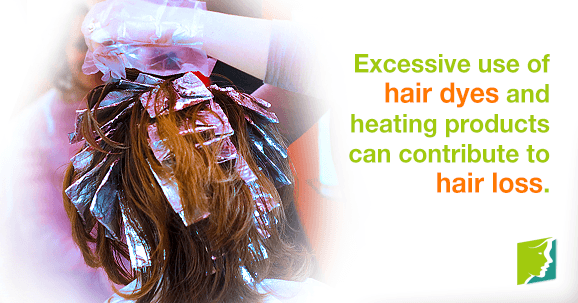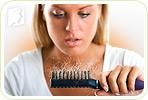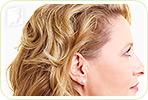A woman's hair is often very important to her, and many women see a full head of healthy, shiny hair as vital to their image and self-confidence. While it's normal for approximately 100 hairs to be shed from the scalp each day, certain factors can intensify natural shedding or lead to hair loss known as alopecia. Using certain hair products can influence hair loss, as the chemicals and processes involved in many popular products can cause follicle and hair shaft damage.
Hair Products and Hair Loss
Lead is a key ingredient in most hair dyes and has negative effects on the central nervous system. The oxidative stress lead can create in the scalp is likely to contribute to hair loss. Bleach is damaging to existing hair even with responsible use, as it reduces moisture in the hair shafts, often leading to dry, brittle, and thinning hair. When left on for too long, bleach may cause hair to break off at the root.
Using heat products is also harmful to the hair. Curling tongs, straightening irons, and even hairdryers cause surface damage to the hair shafts, making dryness, breakages, and hair thinness more likely.
While using hair products from time to time is unlikely to have a significant impact on hair health, regular use can cause or contribute to hair loss. To limit damage, use a hairdryer at a distance of around six inches (15 cm) from the scalp, and avoid excessive use of other heat products, dyes, and bleach.
Other Causes of Hair Loss
There are many other reasons women may experience hair loss. Menopause, for example, is a biological cause of hair loss. Hair follicles and their health are controlled by hormones, such as testosterone and estrogen. The changes in levels of these hormones during perimenopause can cause follicles to wither and hair to become thin, patchy, and brittle.
Stress and anxiety can also trigger hair loss, and alopecia contributes to stress, which can create an upsetting and ongoing cycle of hair loss and anxiety. Autoimmune diseases, such as alopecia areata, may lead to excessive and continued hair loss due to white blood cells attacking hair follicles. In addition, medications such as chemotherapy and contraceptives like the birth control pill interfere with hormone levels in the body, which may trigger or worsen hair loss.
Healthy Hair Care
To keep hair healthy, following a gentle hair care regimen is essential. Avoid excessive exposure to the sun, chlorine, and wind, as these dry the hair out and make breakages more likely. Be careful with your hair, use vitamins and supplements to nourish the follicles, and avoid harsh products or twisting hair into tight styles.
After a period of hair loss, it is possible for hair to grow back, though this depends on the causes and the treatments used. In most cases, the regrowth process will require patience. It may be quite frustrating, as hair thinness or patches of baldness are upsetting to live with, but focusing on maintaining the existing hair and looking for other ways to regain confidence can help manage these feelings.
For more information on hair loss and how to treat it, follow the links below.
Sources
- Environmental Protection Agency. (2015). Healthy Hair Care and the Environment. Retrieved February 2, 2016, from http://www.epa.gov/region9/healthy-hair/health.html
- Lee, Y. et al. (2011). Hair shaft drying from heat and drying time of the hair dryer. Annals of Dermatology, 23(4), 455-462. doi:10.5021/ad.2011.23.4.455
- Office on Women's Health. (2008). The Healthy Woman: A Complete Guide for All Ages. Skin and Hair Health. Retrieved from http://www.womenshealth.gov/publications/our-publications/the-healthy-woman/skin_hair.pdf




